
About
Creator of the Indie Gospel network and one of its contributing artists.
Stats
Profile Tag Cloud:
Strange Fire or Gifts of the Spirit?
Introduction
There is a huge controversy shaking the institutional Churches and it has once again been brought to the forefront. One of the principle players in this " in house " debate is John MacArthur, the author of Charismatic Chaos and sponsor of the recent Strange Fire conference. He is not without his critics - here is a well written, downloadable PDF called A Response to Charismatic Chaos by Rich Nathan.
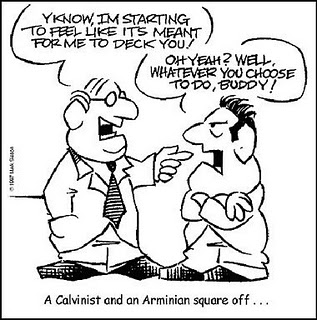 MacArthur is a rather strict cessationist and an " old school " proponent of Calvinism. Personally, I reject Calvin's cold determinism and identify more closely with the particular brand of Arminianism espoused by John Wesley. Nevertheless, I do appreciate the contributions of the Reformed tradition, and the sober minded sincerity of men like MacArthur. His style can be somewhat acrimonious and dogmatic, but I share his concerns.
MacArthur is a rather strict cessationist and an " old school " proponent of Calvinism. Personally, I reject Calvin's cold determinism and identify more closely with the particular brand of Arminianism espoused by John Wesley. Nevertheless, I do appreciate the contributions of the Reformed tradition, and the sober minded sincerity of men like MacArthur. His style can be somewhat acrimonious and dogmatic, but I share his concerns.
While I disagree with his cessationist interpretation of several key scriptures, I can easily relate to many of MacArthur's criticisms of the foolishness, fakery, and false spirituality found in much of the charismatic movement. Some of it appears dangerous, having more in common with the Kundalini force of Eastern mysticism, than it does with gifts of the Spirit. I agree that it is wise (and Biblical) to " test the Spirits " - since pagans , and witches also manifest tongues and various ecstatic " experiences ".
In other words, just because something supernatural is taking place, does not necessarily mean it is "of" God. That being said, we also don't want to " limit" God. Part of the problem is that Christendom has put great emphasis on Christology, and ecclesiology, but pneumatology has been largely neglected. God is sovereign and can pour out his Spirit upon men if he chooses. In fact, according to scripture he has already done so.
Acts 2:17 - 'In the last days, God says, I will pour out my Spirit on all people. Your sons and daughters will prophesy, your young men will see visions, your old men will dream dreams."
Cessationists claim that what is being manifested by the over 500 million charismatic Christians in the world today, is at best fakery and at worst demonic. Continuists acknowledge there are counterfeits and charlatans at work, but the Spirit of the living God is still being poured out upon those whose hearts are open. What is the truth on this issue?
Proves Too Much
There is much fodder for cessationist cannons. They can point to many strange and (to be kind) questionable manifestations, such as the embarrassing saga of Todd Bentley , or the wicked Kansas City Prophets who were embraced by some of the most prominent continuists before they were exposed. Cessationists, rightly (in my opinion) question whether the howling hyenas of the Toronto blessing are filled with the Holy Spirit of God Almighty, or by something else? They see no discernment, testing the Spirits, or sound doctrine apprehended by a sober mind in such bedlam and chaos. Is God the author of confusion?
1 Cor. 14:33 For God is not a God of confusion but of peace. As in all the churches of the saints...
No one disputes these type of shocking events are taking place, but are they being used by MacArthur in an attempt to prove too much ? He doesn't confine the topic to cessationism. He makes sweeping generalizations from these aberrations, building an " ugly caricature" of the charismatic movement. Then he contrasts his traditional Reformed theology to this " strawman ", as if that somehow lends credence to his dogma. This is a false dichotomy, an appeal to extremes which employs reductio ad absurdum to insult the truth.
 MacArthur says " By contrast , Reformed theology, sound doctrine, is not a haven for false teachers...", which is a great insult to Reformed Charismatics within his own camp. They are charismatic not because they are ignorant of scripture, or of traditional Calvinism, but because they can't deny what the Bible teaches and their existential experience confirms.
MacArthur says " By contrast , Reformed theology, sound doctrine, is not a haven for false teachers...", which is a great insult to Reformed Charismatics within his own camp. They are charismatic not because they are ignorant of scripture, or of traditional Calvinism, but because they can't deny what the Bible teaches and their existential experience confirms.
Moreover, his rhetoric is even more insulting to Arminians . He seems to forget that Arminius, Grotius, Laud, Wesley and many other brilliant and renowned theologians overturned the dogmas of Calvinism from scripture . Perhaps this short video will be helpful Why I'm Not a Calvinist .
I love our Calvinist brothers, and since they hosted the conference we must forgive their dogmatism in presenting Calvin as the " touchstone" of Christianity. Not to put too fine a point on it, but that honor belongs to another - Christ.
In the rather lengthy article which follows, cessationism is refuted and the acknowledged problems with the charismatic movement are put into proper perspective. In the process, MacArthur's deceptive " strawman " argument is skewered on the pitchfork of truth, it's innards exposed to the withering light of scrutiny.
Undeniable Problems
Despite his overreach, I do appreciate the good talking points brought out by MacArthur's rhetoric. However, I find his cessationist exegesis of some of the relevant scriptures to be flawed. I must agree (for the most part) with Andrew Williams in his assessment.
In fact, I think that the division of the gifts such that the miraculous or " sign " gifts have ceased, including tongues, prophecy and healing, but the " normal " gifts like teaching carry on, is an imposed and artificial distinction based on bias, not sound exegesis. Many of the nuances, subtleties, and vagaries of the opposing positions are touched on here
For me, the key is that 1 Cor 1:7, 13:10 have the gifts continuing to the perfection obtained at the second coming of Christ, not the closing of the canon. Joel 2 28-29 places the gifts eschatologically in the last days, not limited to Pentecost but starting there. There is no getting around these facts, however the case for ecstatic tongues is textually very weak.
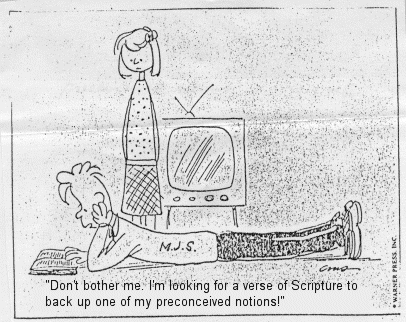 How weak? Early Pentecostals themselves believed that tongues were real earthly languages ( xenoglossia ) and not private prayer language, or "ecstatic" tongues. A new interpretation began to receive attention in the 19th century, but the traditional view still dominated until the mid 20th century. Eventually " categories " of tongues became accepted, accommodating " subjective experiences " with the type of glossolalia common among pagans. Biblical and historical support is strained, and some continuists reject ecstatic tongues as counterfeit , a repeat of the ancient Montanist heresy.
How weak? Early Pentecostals themselves believed that tongues were real earthly languages ( xenoglossia ) and not private prayer language, or "ecstatic" tongues. A new interpretation began to receive attention in the 19th century, but the traditional view still dominated until the mid 20th century. Eventually " categories " of tongues became accepted, accommodating " subjective experiences " with the type of glossolalia common among pagans. Biblical and historical support is strained, and some continuists reject ecstatic tongues as counterfeit , a repeat of the ancient Montanist heresy.
S.C. Todd of the Bible Missionary Society investigated eighteen Pentecostals who went to Japan, China, and India ‘expecting to preach to the natives in those countries in their own tongue,’ and found that by their own admission ‘in no single instance have [they] been able to do so.’ As these and other missionaries returned in disappointment and failure, Pentecostals were compelled to rethink their original view of speaking in tongues” (Robert Mapes Anderson, Vision of the Disinherited: The Making of American Pentecostalism). The conclusion was soon reached that their “tongues" were not earthly languages but a “heavenly” or special prayer language - A Private Prayer Language ?
This video was produced by someone who grew up in the Assemblies of God and is well acquainted with tongues. He argues that the ecstatic tongues commonly practiced today are a counterfeit, but the true gift is legitimate, relevant, not for everyone, and produces real languages. This article by noted Christian author Ray C. Stedman presents a similar view.
In addition to accepting ecstatic tongues, Pentecostals also insist that ALL must speak in tongues as initial evidence of Spirit Baptism, though this is not currently accepted by most charismatics. It may come as a shock to some Pentecostals that Charles Fox Parham (the originator of this doctrine) believed in tongues as real languages ( xenoglossia ), and viewed the ecstatic type of tongues (glossolalia) widely practiced today as false, even demonic .
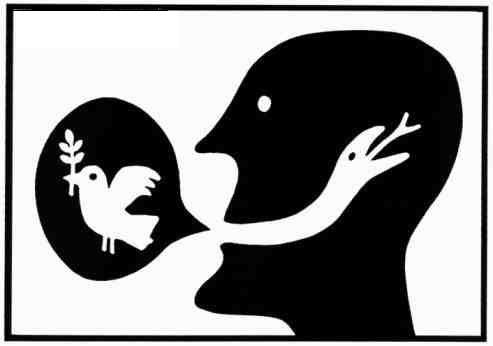 Hear this: three-fourths of the so-called Pentecosts in the world are counterfeits , the devil's imitation to deceive the poor earnest souls. . . . Many hundreds, in seeking Pentecost, were taught to yield to any force, as God would not permit them to be misled; under those conditions they were ripe for hypnotic influence . . . . Two-thirds of the people professing Pentecost are either hypnotized or spook-driven , being seized in the first place with a false spirit or coming under the control of one afterward. We cannot be too careful to try or test the spirits and any person unwilling to have their experience tested by going to God for themselves or with the brethren, reveal the fact that they are demon-controlled . . . . They plead the blood, and claim to be Jesus, giving messages, and imitate every gift of the Holy Spirit and Pentecostal tongues . Charles Parham, 1911 " The Everlasting Gospel " (55, 72, 120-121)
Hear this: three-fourths of the so-called Pentecosts in the world are counterfeits , the devil's imitation to deceive the poor earnest souls. . . . Many hundreds, in seeking Pentecost, were taught to yield to any force, as God would not permit them to be misled; under those conditions they were ripe for hypnotic influence . . . . Two-thirds of the people professing Pentecost are either hypnotized or spook-driven , being seized in the first place with a false spirit or coming under the control of one afterward. We cannot be too careful to try or test the spirits and any person unwilling to have their experience tested by going to God for themselves or with the brethren, reveal the fact that they are demon-controlled . . . . They plead the blood, and claim to be Jesus, giving messages, and imitate every gift of the Holy Spirit and Pentecostal tongues . Charles Parham, 1911 " The Everlasting Gospel " (55, 72, 120-121)
Could it be that continuationism is correct and desiring the gifts is commendable, but the radical changes made to the role and nature of tongues are ill-advised?
That is a vital question, but it is not the only one we should be asking. Are warnings of a false Kundalini spirit fear mongering, or some type of conspiracy theory? Is the charismatic movement a repeat of the ancient Montanist heresy? What about the numerous " anointed " charlatans that keep getting exposed? Can we allow subjective experience to drive our interpretation of scripture? At the very least, these questions should underscore our need to be cautious and discerning - were we not told to test the Spirits?
1 John 4:1 - Dear friends, do not believe every spirit, but test the spirits to see whether they are from God...
 In any case, I must add my voice to the growing chorus of critics on both sides , bewailing the loathsome and repulsive prosperity Gospel . It is so vile and heretical as to be beneath the dignity of a critical response. 1 Timothy 6:6-10 condemns it, Matthew 6:19-34 as well, plus many other texts. Contrary to MacArthur's assertions, many leaders and groups within the continuist camp oppose it .
In any case, I must add my voice to the growing chorus of critics on both sides , bewailing the loathsome and repulsive prosperity Gospel . It is so vile and heretical as to be beneath the dignity of a critical response. 1 Timothy 6:6-10 condemns it, Matthew 6:19-34 as well, plus many other texts. Contrary to MacArthur's assertions, many leaders and groups within the continuist camp oppose it .
Why make millionaires out of greedy charlatans while innocent children starve to death? If you have the means, sow into pure religion rather than feed wolves. Here are some needy orphans who really do need your help - Change for Children
Disagreements on Interpretation
In the " Strange Fire " conference, Tom Pennington makes the clearest, most direct case for cessationism. Though logically laid out, his arguments are easily countered as not demonstrably Biblical. The short simple response of Andrew Williams destroys both his contentions and the foundation of the entire conference. Nevertheless, Pennington's point on ecstatic tongues vs real tongues is well taken, and Williams neatly sidestepped it.
Phil Johnson goes beyond Pennington's clearly stated but unconvincing position. He complains that he can't find the " baby in the bathwater ", and draws the wrong conclusion out of the murk instead.
Like MacArthur, much of what he says in criticism of the Charismatic movement is true, but he attacks the weakest points, uses the most extreme examples, and paints with too broad a brush. I agree that charlatans abound and there is widespread counterfeiting of gifts occurring, but does that preclude the genuine ?
His unworkable attempt to deny modern miracles, while simultaneously denying charges of deism, involves some interesting theological gymnastics. Like Pennington, he spends a great deal of time fishing with the " red herring " of primary usage. I agree that the eyewitness Apostles were indeed testified to with mighty signs and wonders, but that in no way limits the gifts to believers .
 1 Corinthians 14:4,26 shows that the specific spiritual gifts being denied, were given to ordinary Christians (not just apostles) for the edification (or building up) of the Church. 1 Corinthians 1:7, 13:8-12 shows they will continue until the coming of the perfect which is the perfection obtained at the second coming of Christ (not the closing of the canon).
1 Corinthians 14:4,26 shows that the specific spiritual gifts being denied, were given to ordinary Christians (not just apostles) for the edification (or building up) of the Church. 1 Corinthians 1:7, 13:8-12 shows they will continue until the coming of the perfect which is the perfection obtained at the second coming of Christ (not the closing of the canon).
Johnson appeals to a need for precision of terms, but then uses providence as a sort of " weasel word ". Within Reformed Tradition itself there is no agreement on how to define the word miracle. The simple truth is lost in a maze of categories and layers of providence, all convoluted around a framework of predestination.
He mixes in some valid points about fakery and frauds but after all his rationalizing and categorizing is over, the miraculous is buried beneath the skirts of providence, paradoxically acknowledged and denied by his sophistry. Modern miracles are conceded as a technical possibility under the category of rare extraordinary providences, but denied as an experiential reality, or as a continuation of God pouring out his Spirit to edify the Church.
Slippery semantics notwithstanding, nothing can extradite a cessationist from the dilemma that God is still immanent, still miraculously answers the prayers of the faithful, and still bestows spiritual gifts to edify and build up the body of Christ until he returns.
1 Corinthians 1:7 Now you have every spiritual gift you need as you eagerly wait for the return of our Lord Jesus Christ.
I would agree with Johnson that miracles are no where near as routine and commonplace as the shenanigans in Charismatic circles. There are certainly tares among the wheat, shamelessly counterfeiting signs and wonders to draw huge followings after themselves. Nevertheless, God's arm has not been shortened, and there is no excuse for rank unbelief in the truly miraculous happening in the here and now.
Musical Machinations
On the topic of worship music, MacArthur shoots himself in the foot and sticks the other one in his mouth. He promotes anachronistic hymns and pipe organ music as pious and reverent, while sanctimoniously condemning contemporary styles as unfit, irreverent, even dangerous. This is a biased unbiblical position, which is totally SHREDDED in a free e-book entitled In Defense of Contemporary Christian Music .
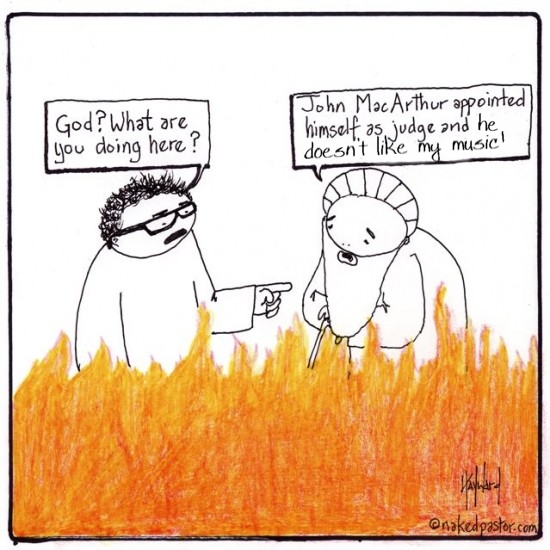 Think about it! His introduction to the conference involves God striking down those who offer improper worship, using Lev. 9,10 as an example. I agree, God is deadly serious about proper worship. In fact, he also struck Uzzah down in 1 Chron. 13:9 for simply touching the Ark . So, as MacArthur suggests we should ask the question - what musical worship style does God accept?
Think about it! His introduction to the conference involves God striking down those who offer improper worship, using Lev. 9,10 as an example. I agree, God is deadly serious about proper worship. In fact, he also struck Uzzah down in 1 Chron. 13:9 for simply touching the Ark . So, as MacArthur suggests we should ask the question - what musical worship style does God accept?
In answer, was God displeased or did he strike anyone down for their loud and joyous musical merrymaking which obviously employed strong rhythm and even dance - around that very same Ark ?
2 Samuel 6:5 And David and all the house of Israel were making merry before the LORD, with songs and lyres and harps and tambourines and castanets and cymbals ... And David danced before the LORD with all his might.
Perhaps in claiming the Word as his final authority, MacArthur should have the integrity to incorporate scriptures like 2 Samuel 6:5 (not to mention Psalm 149, 150, and dozens more) into his theological perspective. Staid, somber, and rhythmless, does not equate to reverent in the Bible. Rhythmic and danceable does not equate to evil in the Bible. God is sovereign and can decide for himself what is acceptable, scripture is far from silent on the subject .
Wackos vs Brainos
MacArthur also points to " wackos " in the continuist camp, mired in gross sin and suffering from lack of scholarship. He makes the Todd Bentleys of the charismatic movement representative of the whole, such that they become a " strawman " to knock down 500 million confessed Christians. Personally, I find that to be an offensive and fallacious form of ad hominem attack.
 To illustrate the pejorative nature of this unsavoury tactic, one only has to examine the intellectuals with solid degrees in theology and great ecclesiastical standing, who are often worse than the " wackos " (not that the Reformed tree doesn't have it's share of nuts). Someone may have D.D. behind their name, possess a great depth of Scriptural knowledge, be well spoken and well dressed in a dark suit or flowing robes, but does that mean they are born of love, have correct doctrine, or are even remotely moral? Not according to the sorted history of the Church, or to recent revelations in the modern media.
To illustrate the pejorative nature of this unsavoury tactic, one only has to examine the intellectuals with solid degrees in theology and great ecclesiastical standing, who are often worse than the " wackos " (not that the Reformed tree doesn't have it's share of nuts). Someone may have D.D. behind their name, possess a great depth of Scriptural knowledge, be well spoken and well dressed in a dark suit or flowing robes, but does that mean they are born of love, have correct doctrine, or are even remotely moral? Not according to the sorted history of the Church, or to recent revelations in the modern media.
Bishop Raymond John Lahey had a Bachelor of Theology (B.Th), a Licentiate in Theology (L.Th.), and Doctor of Philosophy (Ph.D.). He graduated magna cum laude (with honors - above average). He served as a Professor of Religious studies, and head of the department. He had a distinguished ecclesiastical career with many postings, including chancellor of a top ranked University. Despite the letters behind his name, and his scholastic knowledge of Scripture, this man was caught lying to protect the pedophile Priests in his charge and was himself caught importing child pornography of the most graphic, horrendous, and torturous kind .
Obviously, s omething more is required than just rationally apprehending the Word , one must be in a saving relationship with the one the Word points to - Jesus. This involves being born again by the Spirit of God who does indeed give gifts, the greatest of which is love.
1 John 4:7-8 Everyone who loves has been born of God and knows God. Whoever does not love does not know God, because God is love.
Although the abuses of the Catholic clergy are legion and infamous, Protestant Ministers are often guilty of the same crimes, though well studied and holding respected positions in their various ecclesiastical institutions. In my country (Canada) the Catholic, Anglican, and United Churches would ALL be bankrupt if the government did not pay off the abuse claims against them, generated by the long list of horrors perpetrated against helpless native children at r esidential schools .
To listen to MacArthur and Phil Johnson , one would think the perpetrators were all charismatic and ignorant. Perhaps they should look in the Reformed closet for skeletons, starting with Calvin who was no angel as the Jews and anabaptists can attest. Why limit their search engine to only find deviants in the " enemy " camp, this small study below provides a view that isn't colored by their bias and deception.
Of the accused clergy, 75 were Catholic priests (39.5%) and 111 were Protestant ministers (58%). (Also charged were 1 Mormon clergyman, 1 occult minister and 2 cult ministers.) Protestant cases involved equal numbers of mainstream and fundamentalist/evangelical denominations . Clergy Who Molest
A Boat Needs Both Oars
The sad and disgusting state of affairs in the Churches today serves as a cautionary tale, but don't let revulsion or reaction lead to extreme positions. Perhaps this analogy will illustrate the basic problem. A boat needs both oars working in unison to travel straight and true, throw one away and you are apt to row in circles.
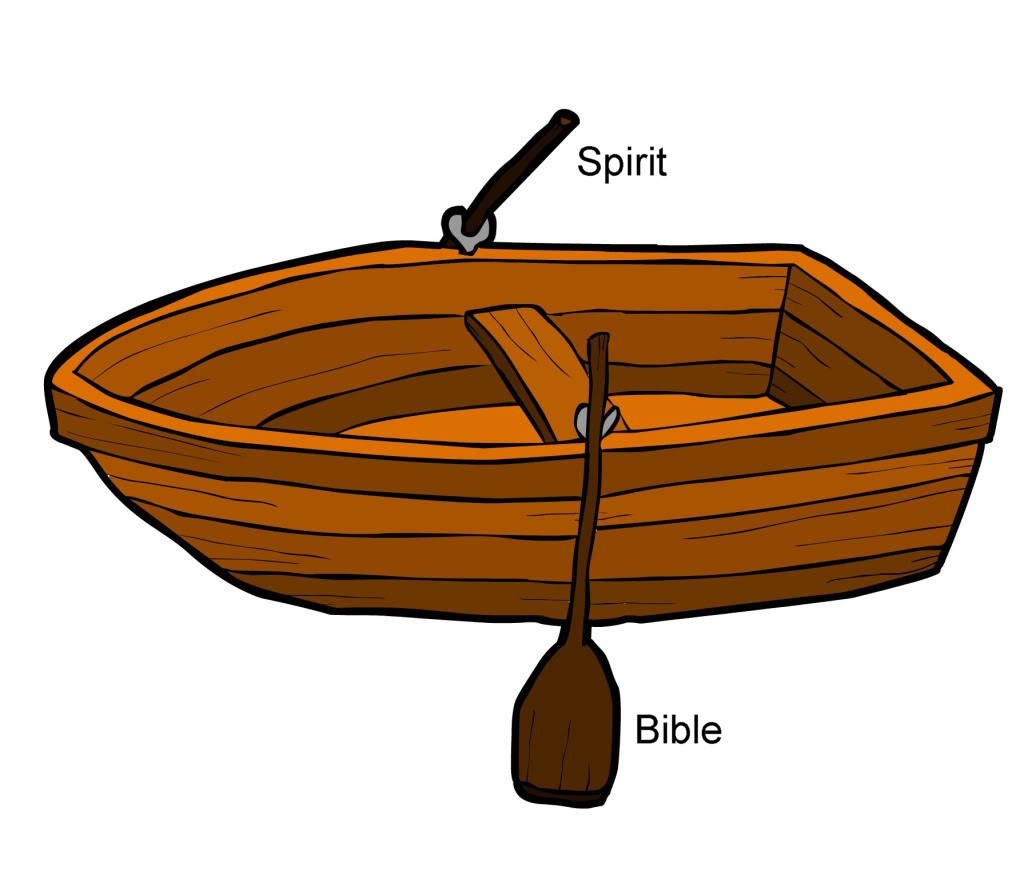 Experience and intuition should complement, not replace, supplant, or contradict the objective truth of God's special revelation - the Bible. At the same time, doctrine should not violate conscience, or thwart a living relationship with God. If it does, it is false dogma not sound doctrine . Consider the words of Christ.
Experience and intuition should complement, not replace, supplant, or contradict the objective truth of God's special revelation - the Bible. At the same time, doctrine should not violate conscience, or thwart a living relationship with God. If it does, it is false dogma not sound doctrine . Consider the words of Christ.
John 4:24 - God is spirit, and his worshipers must worship in the Spirit and in truth.
For instance, It would be a great mistake to follow the transcendentalist Ralph Waldo Emerson in limiting oneself to individualism and the natural revelation described in Romans 2. Granted, history is replete with wars and inquisitions where false religious dogma was enforced to the violation of God given conscience. However, God's word is true and he gave it for a reason - we can't throw it away because of how it's been abused. The natural witness of the inner man is important, valid, and God given, but it should not be the only oar in your boat. The objective truth of scripture keeps one from becoming lost on a sea of subjective thought.
2 Timothy 3:16 All Scripture is God-breathed and is useful for teaching, rebuking, correcting and training in righteousness, so that the servant of God may be thoroughly equipped for every good work.
Many highly trained Churchmen err in the opposite direction, and throw away the other oar. They view inner revelation as inherently unreliable and a potential lure away from the " truths" of dogmatic religion. They give no ear to the voice of God in their hearts, having only a dead intellectual understanding of scripture. Well studied and credentialed religious academics, but bereft of relationship.
We need the Holy Spirit and his gifts. HE is our teacher - the one who wrote the book is not limited to the book. He speaks to us generally through creation and directly to our conscience. Even the heathen (who have no scripture) have no escape from God. What he requires is written on their hearts , their own thoughts defending and accusing them (Romans 2:14-15). How much more so those who diligently seek God and are receptive to his Spirit?
1 John 2:27 But you have received the Holy Spirit, and he lives within you , so you don't need anyone to teach you what is true. For the Spirit teaches you everything you need to know, and what he teaches is true (John 14:26, 1John 3:24, 1 Cor. 2 10-16, Col 1:9).
All scripture is God breathed and useful in making one wise to the way of salvation and obedience. It is the final authority on doctrine and sufficient to guide us, but book learning should lead to and inform ( not replace ), a personal experiential relationship with God through the Ministry of the Spirit.
Romans 8:9 ...the Spirit of God lives in you . And if anyone does not have the Spirit of Christ, they do not belong to Christ .
Listen to this short clip from John MacArthur and you will realize that he has only one oar in his boat . He makes the Bible the SOLE authority and source of revelation, but Sola Scriptura doesn't deny other sources it only subordinates them to scripture. There is a huge difference.
The Spirit inspired the scriptures and MacArthur is absolutely right that we should study them. They are truth, they are authoritative, they do have a sanctifying effect, we should internalize them, they do speak to us, we should share them, but he leaves out the most important thing - we should do what they say .
Knowledge of scripture is not an end in and of itself - they point us to Jesus. We must choose to let Christ into our hearts for real , not just as a theoretical abstraction of intellect. Christ didn't just leave us a book, he left us his Spirit. We must partake of the divine nature, there is a synergism which must take place and it is more than just studying scripture. We must be led by the Spirit (Romans 8:14).
1 Cor. 6:19 What? know ye not that your body is the temple of the Holy Ghost which is in you , which ye have of God...
Ironically, the book itself tells us that, but some are forever studying and never coming to a knowledge of truth . In that short clip, as in many of his diatribes, MacArthur calls upon his " strawman " to deceptively mischaracterize Charismatics as Biblically illiterate. Meanwhile, they apparently know scripture better than he does, because they seek the Spirit of God and his gifts as the book says we should .
Luke 11:9-13 Ask and it will be given...how much more will your Father in heaven give the Holy Spirit to those who ask him!
1 Cor. 14:12 Since you are eager for gifts of the Spirit , try to excel in those that build up the church .
The Rise of Bibliolatry
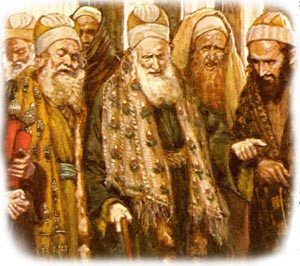 There are currently over 40,000 denominations who disagree over doctrine. Men have argued, fought, and killed over the meaning of scripture for centuries. Why are there so many interpretations when there is only one Spirit?
There are currently over 40,000 denominations who disagree over doctrine. Men have argued, fought, and killed over the meaning of scripture for centuries. Why are there so many interpretations when there is only one Spirit?
Long ago, the Catholic Church elevated it's teaching authority over scripture They claimed that their Magisterium had to interpret it for us, usurping the Spirit's role as teacher. When Protestants broke away, they rightly upheld scripture over tradition, but neglected to restore the Ministry of the Spirit to it's rightful place.
Cursory acknowledgment was given, but in their great rush to defend the sufficiency of scripture, the role of the Spirit in illuminating scripture was an afterthought at best. "Nevertheless, we acknowledge the inward illumination of the Spirit of God to be necessary for the saving understanding of such things as are revealed in the Word" (Westminster Confession of faith, 6:6).
The Reformation left us a wealth of sermons, creeds, and treatises defending the sufficiency of scripture but today they are often misapplied and misunderstood. Originally written to defend against the traditions of Rome, they are now used by some against the Holy Spirit. They think the Spirit's ministry was confined to inspiring the book and is now over. No longer does he speak through nature, or experience, or relationship, or strive with men's hearts. Contact with God has been reduced to a rationalist understanding of scripture.
Guidance from God through dreams, visions, prophetic words, words of knowledge and wisdom are rejected outright, as a knee-jerk reaction to the counterfeits of charlatans. Fear of receiving a false Spirit has led to exclusion of the true Spirit. Illumination of scripture becomes impossible, and multiplied disagreements among dead religionists abound.
 This downloadable PDF by J.P. Moreland Ph.D., Th.M., explains how Bibliolatry has become entrenched in Evangelical Christianity. He is one of the few scholars seeing the issue clearly and raising the alarm. To be fair, here is a defense against the charge of Bibliolatry by John MacArthur .
This downloadable PDF by J.P. Moreland Ph.D., Th.M., explains how Bibliolatry has become entrenched in Evangelical Christianity. He is one of the few scholars seeing the issue clearly and raising the alarm. To be fair, here is a defense against the charge of Bibliolatry by John MacArthur .
MacArthur once again evokes his " strawman " and argues from extremes. He grudgingly concedes to the need for illumination and indwelling, albeit in the most diminished sense possible. He admits he has never really felt the presence of God, and sees the Spirit as a one time permanent deposit that is static, unchanging, and imperceptible, rather than a person we have a dynamic living relationship with.
We receive the Spirit when we enter into a saving relationship with God, but what of all the verses that explain the nature of this relationship? Whether one believes in a secondary baptism of the Spirit, or being filled and refilled, it is evident that the relationship is not static. God is seeking us, but are we pursuing him, yielding to him, limiting him, or excluding him? Here is a downloadable PDF that explains - We have as much of God as we actually want ~ A.W. Tozer
It is up to us to let him in (Rev. 3:20). We must ask for the Holy Spirit (Luke 11:13). We can quench (1 Thess. 5:19), we can grieve (Eph. 4:30), we can resist (Acts 7:51), we can blaspheme (Mark 3:29), or we can be willingly led by the Spirit (Romans 8:14). The synergy created by our desiring, yielding, and cooperating is the key to life in the Spirit. We can be FILLED (Eph. 5:18) and unlike the barrenness of MacArthur's self imposed desolation, the Spirit's presence IS known by those who are joined to Him.
Romans 8:16 The Spirit himself testifies with our spirit that we are God's children.
If the Spiri t lives in you , HE can lead you into a right understanding of the book, since HE inspired it. If you make the book the only oar in your boat, you are doomed to go in circles that lead nowhere, lost on an endless sea of dead religion .
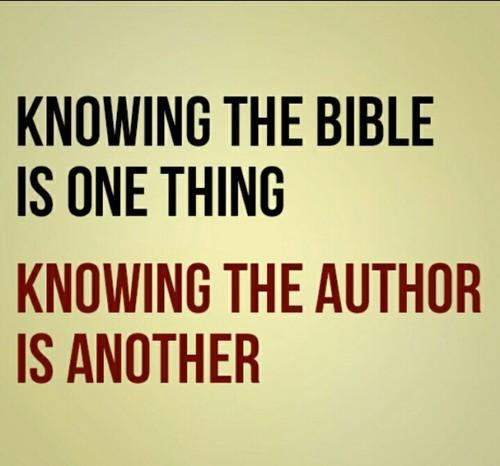 1 Corinthians 2:14 - But people who aren't spiritual can't receive these truths from God's Spirit. It all sounds foolish to them and they can't understand it, for only those who are spiritual can understand what the Spirit means.
1 Corinthians 2:14 - But people who aren't spiritual can't receive these truths from God's Spirit. It all sounds foolish to them and they can't understand it, for only those who are spiritual can understand what the Spirit means.
Sufficiency of scripture doesn't mean the book is sufficient to save you, it's only sufficient to guide you into a spiritual relationship with the one who can save you - Jesus Christ. His words to the Pharisees are just as relevant today as they were then:
John 5:39-40 You diligently study the Scriptures because you think that BY THEM you possess eternal life. These are the Scriptures that testify ABOUT ME , yet you refuse to come TO ME to have life.
A Question of Balance
Let's get down to where the rubber meets the road . Most Christians would agree that there is a great danger to abandoning oneself to sensationalism, subjective experiences, and untested Spirits. On the other hand, the Spirit of God is real and the objective truth of scripture should not be only intellectualized, such that there is no experiential relationship with God. The Spirit of God must live in us , such that we are born of his indwelling presence. This rebirth is no less than supernatural, experiential, and miraculous.
 The debate is not so much about continuationism vs cessationism, as it is about the influence of rationalism and supranaturalism on the interpretation of scripture. Which philosophical and linguistic hermeneutics are considered to be applicable, what interpretive formula is to be applied. How can bias born of preconceived notions be prevented from coloring the exegesis brought to the table by each camp.
The debate is not so much about continuationism vs cessationism, as it is about the influence of rationalism and supranaturalism on the interpretation of scripture. Which philosophical and linguistic hermeneutics are considered to be applicable, what interpretive formula is to be applied. How can bias born of preconceived notions be prevented from coloring the exegesis brought to the table by each camp.
Most Protestants (including me), believe in Sola Scriptura which does not deny other authorities but demands that all other authorities are subordinate to, and are to be corrected by, the written word of God. However, as in the Wesleyan Quadrilateral , some (lesser) weight has to be given to reason, tradition, and experience.
It's this balance that is at issue . Reformed Protestants are quick to point out the danger of Prima Scriptura (and I agree), but they are seemingly oblivious to Bibliolatry. Scripture is the final authority, but we are not to make an idol out of our Bible such that it replaces a relationship with God. The Enlightenment gave rationalism a prominent place at the table, but we must not become fettered by chains of reason. Tradition shouldn't be undervalued, it bears the witness of history. Personal experience cannot be dismissed, as it validates the Biblical promises of God as realized and present in the life of a believer.
To know God is to be born of love which is a mystical, supernatural experience. Like the wind in the trees, it's something hard to pin down with words or logic. At some point, we must acknowledge the limits of rationalism and stop trying to catch time in a bottle. God transcends our understanding, his ways are past finding out (Romans 11:33).
Moreover, it is the immanence of God that is being denied by cessationists, almost to the point of becoming deists (though they deny this). The rationalism of the enlightenment (while beneficial in many respects), swung the pendulum too far, leaving no room for mystery and no possibility for the truly miraculous. Like the people of Christ's hometown, cessationists don't have faith to experience the miraculous. They have no expectancy of God pouring out his power, even though he stands in their midst.
What About the Gifts?
Does the Spirit of God still give gifts? Yes, different ones to different members of the body as he sees fit . In fact, we are to desire the better gifts such as prophecy, and use them to edify the body. Paul's question - do all speak in tongues, carries it's own answer - no. Are these tongues real languages? They were on the day of Pentecost when they were first poured out.
The case for ecstatic tongues, or a private prayer language, is (to be generous) textually very weak. To be fair, that interpretation can be found here , a refutation can be found here (decide for yourself). In any case, no one should be " babbling " in Church with no interpreter, that is expressly forbidden.
It must be acknowledged that sincere Christians, genuinely seeking God are speaking in ecstatic tongues, but so are known charlatans . Moreover, Voodoo practitioners, Buddhist and Shinto priests, Muslim dervishes, Indian fakirs, witches, spiritualists, and Hindu gurus can also speak with ecstatic tongues . Spastic movements, shaking, energy, ecstasy, laughter, love, miracles, and healings are also associated with their manifestations.
In light of these facts, it seems unwise to allow these subjective experiences to influence our interpretation of scripture. On the other hand, we can't rule out the genuine , just because there are counterfeits. So, where does that leave us? This video below from Pastor Tim Conway attempts to address that question.
The ecstatic tongues controversy is as old as Montanism , and has flared up again and again over the centuries . The arguments have grown increasingly sophisticated but the underlying tension remains unresolved. We are right to desire spiritual gifts, but at the same time we must test the spirits to see whether they are from God (1 John 4:1). The Bible warns that convincing signs and wonders will be used in an attempt to deceive in the last days.
"For there shall arise false Christs, and false prophets, and shall shew great signs and wonders ; insomuch that, if it were possible, they shall deceive the very elect." Matt. 24:24 [Mark 13:22; Luke 21:8]
So, are the gifts really for today? Yes, but given as HE sees fit, in HIS timing, according to HIS will, to fit HIS plan. In longing for them, don't throw caution to the wind and accept counterfeits - test the spirits . The genuine gifts are given to build up the body, not for individuals to draw attention to self, authenticate false doctrines (or teachers), or to replace orderly edifying Church services, with the babbling spasmodic ecstasies of paganism.
Avoid the extremes on this issue as in so many others. Rather than become polarized and create a false controversy where none should exist, we should attempt to integrate the objective truth of sound doctrine , with a personal born again experience , whereby God's Spirit indwells, gifts, guides, empowers, sanctifies, and most importantly imparts love. After all, if it does not become natural for us to love, then we have missed the boat entirely and our faith is in vain - no matter what theological position we hold on these issues.
1 Corinthians 13:1-2 If I s peak with the tongues of men and of angels , but do not have love, I have become a noisy gong or a clanging cymbal. If I have the gift of prophecy, and know all mysteries and all knowledge ; and if I have all faith, so as to remove mountains, but do not have love, I am nothing.







Wow! What a wonderful treatise you have written here! I must say that your understanding and mine are identical, and I believe we're not alone, Brother.
I especially like the fact that you didn't just wash over questionable practices among charismatics. Some completely avoid mentioning them. And I believe that's a serious mistake. Anyone with eyes can see fakery if they only look. But fakery does not make the moving of the TRUE SPIRIT null and void. As the Scripture says, "let God be true and every man a liar".
I thoroughly enjoyed reading this.
Great job, Ken, I agree 100%. Without the leadership of the Holy Spirit guiding us, we are just absorbing words that aren't meaningful to our Christian walk. There is only one truth and that comes through God via the Holy Spirit. Trying the spirits is very important because Satan has powers even greater than us only, but through the leadership of the Holy Spirit, we have God's truth within His will for our lives. Thanks for your thoughts and understanding.